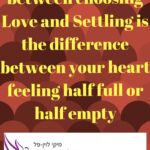With Shavuot looming ahead, I have the topic of commitment on the brain.
When I think about what it took for Am Yisrael to commit to taking on the observance of all the commandments in the Torah, I think about what enabled them to take the leap and do it.
When we were given the Torah we had little to go on in terms of what was required of us. Heck, we didn’t have a clue what we were getting ourselves into! We didn’t know what we were committing to, and yet we said Naaseh v’nishma (we will do and then we will hear) under duress.
All we had to go on was our existing relationship with Hashem up until that point.
We knew we were loved, because Hashem put himself out to save us from slavery in Egypt and had sustained us in the desert for 40 years. We also had the trials along the way with different nations trying to murder us.
While we didn’t know all the facts that go into observing the laws of the Torah, we did have some fundamentals to go on.
We had feelings of love and trust and an unwavering belief in our ability to remain in the relationship from Hashem towards us. For a long time we were in a one-way relationship. More like a parent child relationship- unconditional love.
Giving Am Yisrael the Torah was like Hashem giving us an opportunity to step it up…to grow, to become adults. It was an invitation to create a shift in the relationship. By committing to keep the laws of the Torah without knowing all the subtle nuances involved, we were agreeing to keep up our end of the relationship. To fulfilling our part of the commitment.
When it comes to committing to a romantic relationship there are many unknowns. We don’t know that our partner will remain faithful. We don’t know what our partner is fully capable of. Whether they will be a good parent, be able to cope with challenges, pay bills on time, show up when expected, be emotionally present when necessary…these are all things we hope will go well, but they remain a mystery until tested on a more prolonged and ongoing basis.
We occasionally get a glimpse of our partner through online dating or a face book profile or out on a date. They share all these theoretical things about themselves that often have little bearing on a relationship, like what and where they studied, a bit about their religious observance, their hobbies. Very little of this has a bearing on a relationship. They’re just cold facts.
What we learn about our partner then gets backed up by things they say about themselves, and is tied in with the things you share about yourself.
Attraction and feelings, often strong even confusing ones, come into the mix which sometimes causes us to dismiss, overlook or pardon certain otherwise inexcusable actions….some how we wind ourselves into a relationship.
The difference between our mortal relationship and the one we have with Hashem is that unlike Hashem, we are seriously flawed, fallible and inconsistent human beings.
We may feel strongly about something one minute and after mulling it over, talking with friends, flip around and feel completely different later.
We may have wonderful intentions of being able to keep certain promises towards our partner. But sometimes all the will in the world won’t make it happen. Competing views and demands get in the way of being able to fulfill everything we initially say we’ll deliver.
So despite the ever ebb and flow of feelings, changes in ideology and belief systems, some of us still do manage to commit and remain committed to being there for our partner.
Commitment is extremely hard for many of us – especially when we put demands on our partner and make the relationship contingent on certain behaviors, beliefs, and outcomes.
For example, if we make our relationship contingent on actions from the other, we set ourselves up for disappointment. Our partners will often do things that go against our better judgement and way of thinking. The more we remain steadfast in our commitment ( i.e. have their back) and believe they have our best interests at heart, even though it may not always appear that way, the more we can get through the rough patches.
As Hillel says:
אם אין אני לי,מי לי? ואם אני לא לעצמי, מה אני?
Im ain ani li mi li? v’im ani lo latzmi, mah ani?
If I am not for myself, who will be for me? If I am only for myself, what am I?
The more we can commit to and hold onto ourselves and realize that a couple partnership is made up of the sum of two whole people – who occasionally have failings which lead to misunderstandings – the more forgiving we can be. Adopting this belief will enable us to remain committed during all sorts of situations.
By remembering how committed Hashem is and has been to us, we can use this as a prototype for learning how to commit to our partners during all sorts of circumstances.
If commitment feels super hard for you whether you’re in a relationship or would like to be, let me know about it. Send me an email: mlavinpell@gmail.com
